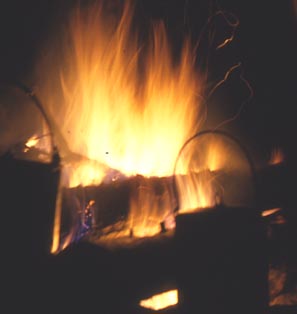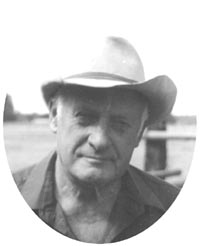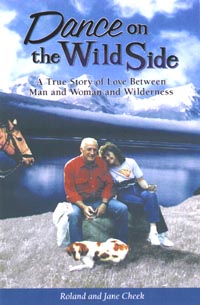a weblog sharing info on outdoor skills and campfire musing by a guy who spends a bunch of time in pursuit of both
CULTURE
WHERE -
TALES ARE TOLD OF
Welcome to Roland Cheek's Weblog
Roland is a gifted writer with a knack for clarifying reality. Looking forward to more of his wisdom
- Carl Hanner e-mail
Lee M. Talbot wrote -- Until recently, most people believed that effective wildlife conservation consisted primarily of protecting animals against wanton killing or capture. And they were right -- at least in part. Since man first appeared on earth, he has driven a number of species to extinction. But all the armies in the world cannot save an animal if it has no place to live, no place to hide, no food to eat. in the years to come, even more so than in the past, the most critical threat to wild animals will not be direct physical assault by man, but rather his destruction of their habitat . . . it is far more difficult to sell the idea of preserving habitat . . . But let's start at the beginning.
To access Roland's weblog and column archives
Click Here
Tip o' the Day
In my mind, kids and colts make a poor combination. Sure, colts are cute and kids are cute. Why shouldn't they grow up together? Johnny or Susy can learn to ride at the same time Ginger learns to be ridden -- right?
Nope. That cute and cuddly colt will grow up much more swiftly than Susy or Johnny. Instead of a cute and cuddly colt, Ginger soon becomes pushy and demanding and spirited and so dangerous that the kids wind up fearing all horses. In my considerable experience, "kid spoiled" horses are to be avoided like the plague -- most especially by kids.
Youngsters should always be started on older horses. Chances are good older experienced horses have rounded a trail bend and came eyeball to eyeball with a grazing bear. Or kicked over a hornet nest. Or stumbled from a hillside trail after dark. Or had kitchenware shake loose inside a packbox they carried. or suffered a saddle that rolled beneath their belly during an impromptu shuffle. An animal with that kind of experience isn't like to injure your child.
It's a rare pony I'd trust with guests until that pony was eight or ten, and had some backcountry trail experience. I would never hesitate to buy a 16- or 18-year-old horse for my grandkids; especially one who acts eager and is plumb gentle.
Most people fail to realize that a 16-year-old horse still has many good years left, provided he's used properly. Such a pony can have upwards of ten to fifteen good years left. Let's say Susy or Johnny is six or eight years old. Do the math! They'll be on their way to college by the time their beloved horse passes over the Great Divide.
Meanwhile they've learned to ride, learned to love animals, and learned responsibilty for a creature they love.
Older horses together with younger kids ae win-win in every respect, perhaps even more so for moms and dads who need not get ulcers every time Susy goes to the corral with sugar cubes in her pocket.
I know lots of kids who started with an older pony, then graduated to something more spirited after they learned how to handle horses. Then is the time for them to start a colt.
A 13- or 14-year-old young man or young woman with prior horse experience will be able to raise and train that colt to perfection. But they'll only succeed if they've, in turn, been raised to perfection by an honorable older horse who loves being pampered by their young friend.
My all-time favorite saddlehorse Buck, whom I wish someday to present in a book that will sell millions of copies to readers of this weblog, wanted nothing to do with retirement at age 25. Instead, the big pony kept trying to crowd into the stock truck as I began loading stock for a wilderness trip. I finally gave up and allowed him to go.
Buck was 29 when Jane and I sold the outfitting business in 1990. You could say Buck and I retired together. He lived three more years.
BACKCOUNTRY "DON'T" LIST
Don't trust a Coleman stove stand in a windstorm. True, the stand lifts the stove to optimum working height. True, the windscreen allows one to cook over open flames in a breeze. But it's also true the windscreen provides enough surface to flutter an anvil and the wobbly stand provides a perfect launch site for a pot of boiling water--as Jane discovered when she reached for it as it headed for orbit.
Fortunately she didn't have to pack horses or row a raft until the next day.
Don't try breaking a renegade horse while on a wilderness packtrip. One of our guides gave this a go while thirty miles into the Bob Marshall Wilderness. By dint of good luck and hard riding, the ALERT med-evac team helicoptered him to a hospital the same day of his compound fracture.
Don't leave a double-bit axe sticking in a chopping block. Fortunately the slice I received while stumbling into same required only a few stitches, instead of a bunch.
Don't try to nail shoes on a nervous pony while wearing only swim trunks. This happened to one of our guides who volunteered on his day off to nail a shoe on a stranger's horse. The torn thigh he received when the horse jerked his hoof away unfortunately required several stitches. And unfortunately, the accident occurred deep inside a wilderness. Fortunately we had a medical practitioner along who had needle and thread. Unfortunately the doc had no anesthetic. Fortunately, my Montana guides were tough.
Don't wear new boots for the first time on your once-in-a-lifetime wilderness trip. Two or three of our hunters have, over the years, tried this tactic. Inevitably they became bored while sitting around camp with crippled feet.
Don't tie your saddlehorse to a dead tree housing a yellowjacket nest. The reason for such precaution is because I discovered the hard way that the horse will be difficult to nonchalantly free from his tether amid a swarm of angered divebombing yellowjackets.
Don't forget your insulin, allergy pills, nitroglycering tablets, or whatever medication is vital to your disposition. It works a hardship on others when you become cranky.
Don't figure others will come looking if you become lst. After three days they just might divide up your stuff and swear to God they never heard of you.
Don't try leading a bunch of horseback riders up a hill so steep a pony could power out before scrambling to the top. Mine made it, but Jane's stopped to rest. Whe he did, he toppled over backwards. She wasn't hurt. Oh, a little blood here and there. But not really hurt.
Don't let your saddlehorse crowd the horse ahead. The lead pony might not like being crowded and he's got twin persuaders (rear hoofs) aimed in your horse's direction. Fortunately, your horse isn't going to take a kick in the head, but will turn to receive the blow in the side. Unfortunately, the side is the same one your leg is wrapped around. Not to worry, though, the ALERT team stands by for this kind of thing, too.
Don't gawk so much at the scenery that you fail to watch your step while hiking a perilous mountain trail. It naturally distresses an outfitter to watch a guest flip-flopping down a mountainside.
Don't take shelter under a tree during a lightning storm. No, we've had no direct acquaintance with this "don't." And there's a good reason why we haven't. It goes back to basic math: the reason lightning never strikes twice in the same place is 'cause that place ain't there no more!
Roland Cheek wrote a syndicated outdoors column (Wild Trails and Tall Tales) for 21 years. The column was carried in 17 daily and weekly newspapers in two states. In addition, he scripted and broadcast a daily radio show (Trails to Outdoor Adventure) that aired on 75 stations from the Atlantic seaboard to the Pacific Ocean. He's also written upwards of 200 magazine articles and 12 fiction and nonfiction books. For more on Roland, visit:
www.rolandcheek.com
Recent Weblogs
Tuesday, April 15, 2008
For more info about these and other Roland Cheek books
There's a bunch of specific info about Roland's books, columns, archives and radio programs. By clicking on the button to the left, one can see Roland's synopsis of each book, read reviews, and even access the first chapter of each of his titles. With Roland's books, there's no reason to buy a "pig in a poke."
for detailed info about each of Roland's books
Read Reviews
Read their first chapters
For interested educators, this weblog is especially applicable for use in history, relationships, and government classes, as well as for journalism students.
Roland, of course, visits schools. For more information on his program alternatives, go to:
NEXT WEEK: MOUNTAIN WEATHER - FEW BETWEENS
www.campfireculture.com
The Phantom Ghost of Harriet Lou is a 352-page book about "the creature" that Roland claims "took me to the wildlife dance." Packed with exciting tales from the years he both hunted elk, and guided others to their lifetime dreams
The best of Roland's 2,700 newspaper columns and radio program scripts. Mostly humor, all personal
Dance On the Wild Side, the story of Roland's & Jane's life together, from childhood sweethearts through five decades of wild adventure!
Two exciting books about the creature Roland says "keeps me dancing."
Learning To Talk Bear is Roland's best selling book, now in its 5th printing. The book describes Roland's own learning experience about the great beasts, profiling several different animals throughout portions of their lives.
Chocolate Legs is an entire book about a single charismatic Glacier National Park grizzly bear who became infamous, with ink spread across Associated Press releases and the New York Times.
Montana's Bob Marshall Wilderness 9 X 12 Coffee Table book, with 97 full color photos on 80 pages, PLUS 10,000 words of "how-to," "where-to" text about the Wlderness one Chief of the U.S. Forest Service called "The Crown Jewell of Our Wilderness System," and another called "The Flagship of America's Wilderness Fleet." The first book ever published about that splended land God insisted on keeping as his own -- just the same as in 1982, when Roland photographed and wrote the book.
source links for additional info
to send this weblog to a friend
to tell Roland what you think of his Campfire Culture weblog
to visit Roland's newspaper columns and weblog archives
0








